Books by David Alexander Palmer
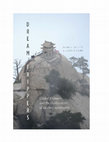
University of Chicago Press , 2017
Over the past few decades, Daoism has become a recognizable part of Western alternative spiritual... more Over the past few decades, Daoism has become a recognizable part of Western alternative spiritual life. Now, that Westernized version of Daoism is going full circle, traveling back from America and Europe to influence Daoism in China. Dream Trippers draws on more than a decade of ethnographic work with Daoist monks and Western seekers to trace the presence and spread of Westernized Daoism in contemporary China. David A. Palmer and Elijah Siegler take us into the daily life of the monastic community atop the mountain of Huashan, exploring its relationship to the socialist state; detail the international circuit of Daoist "energy tourism," which connects a number of sites throughout China; and examine the controversies around Western scholars who become practitioners and promoters of Daoism. They conclude with lively portrayals of encounters among the book's various characters—Chinese hermits and monks, Western seekers, and scholar-practitioners— as they interact with each other in obtuse, often humorous, and sometimes enlightening and transformative ways. Dream Trippers untangles the anxieties, confusions, and ambiguities that arise as the Chinese and American practitioners work through the tensions between cosmological attunement and radical spiritual individualism in their complex search for authenticity in a globalized world.
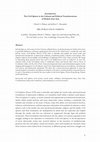
Cambridge University Press, 2019
Leading sociologists who live and work in East Asia examine their region’s most dangerous and exp... more Leading sociologists who live and work in East Asia examine their region’s most dangerous and explosive social problems and some of their most stunning success stories from the viewpoint of civil sphere theory. This new and increasingly influential sociological understanding of democracy aims to describe and explain the moral codes and institutional foundations of democratic solidarity as it manifests itself within a distinct social sphere. Part of a multivolume project, this collection includes cases from Japan, mainland China, Hong Kong, Taiwan, and South Korea, bringing together efforts by sociologists based in East Asian academic institutions. Through an extraordinary blend of s phisticated social theory and path-breaking empirical research, The Civil Sphere in East Asia aims to advance civil sphere theory by globalizing and regionalizing it at the same time.
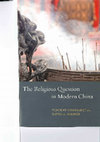
Integrating historical, anthropological and sociological scholarship, The Religious Question in M... more Integrating historical, anthropological and sociological scholarship, The Religious Question in Modern China highlights the parallels and contrasts between historical periods, political regimes, religious traditions and cultural movements, bringing all the strands into a single narrative of how religion has challenged and responded to Chinese secular modernity, from 1898 to 2008. From the moment it appeared as a distinct category in early 20th century China, “religion” became a “question”, an anomaly whose definition and place in a new secular order has always been contested, and which has consistently resurfaced in a bewildering variety of old and new forms. Polities ranging from the late Qing imperium to the contemporary Peoples’ Republic, and colonial and post-colonial regimes in Taiwan, Hong Kong, and Southeast Asia have each attempted to structure the Chinese religious field. Cultural traditions ranging from Confucianism to the martial arts, Chinese medicine, communal temple cults, and revivalist redemptive societies and qigong movements, have been at the centre of fierce polemics and sometimes violent confrontations over their positioning within the modern categories of “religion”, “science”, “superstition” or “cultural heritage,” while Christianity, Islam and Tibetan Buddhism have played key roles in the shaping of China’s international relations and discourse on religion and national identity. Today, China is a de-centred religious universe, expanding centrifugally in all directions.
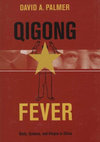
Qigong—a regimen of body, breath, and mental training exercises—was one of the most widespread cu... more Qigong—a regimen of body, breath, and mental training exercises—was one of the most widespread cultural and religious movements of late-twentieth-century urban China. The practice was promoted by senior Communist Party leaders as a uniquely Chinese healing tradition and as a harbinger of a new scientific revolution, yet the movement’s mass popularity and the almost religious devotion of its followers led to its ruthless suppression.
In this absorbing and revealing book, David A. Palmer relies on a combination of historical, anthropological, and sociological perspectives to describe the spread of the qigong craze and its reflection of key trends that have shaped China since 1949, including the search for a national identity and an emphasis on the absolute authority of science. Qigong offered the promise of an all-powerful technology of the body rooted in the mysteries of Chinese culture. However, after 1995 the scientific underpinnings of qigong would come under attack, its leaders denounced as charlatans, and its networks of followers, notably Falungong, suppressed as “evil cults”.
According to Palmer, the success of the movement proves that a hugely important religious dimension not only survived under the CCP, but was actively fostered, if not created, by high-ranking party members. Tracing the complex relationships among the masters, officials, scientists, practitioners, and ideologues involved in qigong, Palmer opens a fascinating window on the transformation of Chinese tradition as it evolved along with the Chinese state. As he brilliantly demonstrates, the rise and collapse of the qigong movement is key to understanding the politics and culture of post-Mao society.
Written by a team of internationally renowned scholars, this volume provides an in-depth introduc... more Written by a team of internationally renowned scholars, this volume provides an in-depth introduction to religion in contemporary China. Instead of adopting the traditional focus on pre-modern religious history and doctrinal traditions, Chinese Religious Life examines the social dimensions of religious life, with essays devoted to religion in urban, rural, and ethnic minority settings; to the religious dimensions of body, gender, environment, and civil society; and to the historical, sociological, economic, and political aspects of religion in contemporary Chinese society.
In Daoism in the 20th Century an interdisciplinary group of scholars explores the social history ... more In Daoism in the 20th Century an interdisciplinary group of scholars explores the social history and anthropology of Daoism from the late 19th century until the present, focusing on the evolution of traditional forms of practice and community, as well as modern reforms and reinventions in China and on the global stage. Essays investigate ritual specialists, body cultivation and meditation traditions, monasticism, new religious movements, state-sponsored institutionalization, and transnational networks.
C onfucianistes, bouddhistes, taoïstes, musulmans, évangéliques protestants, Église catholique, F... more C onfucianistes, bouddhistes, taoïstes, musulmans, évangéliques protestants, Église catholique, Falun Gong… Les religions investissent une Chine que l'on aurait pu croire sécularisée par des décennies de communisme. Cette vie religieuse foisonnante, loin d'être reléguée au folklore, aux marges ou aux lieux communs des anciens sages, est restée un fait social total.
Journal articles by David Alexander Palmer
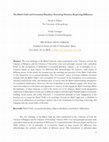
Review of Faith and International Affairs, 2021
The core teachings of the Bahá'í Faith are often summarized as the "Oneness of God, the Oneness o... more The core teachings of the Bahá'í Faith are often summarized as the "Oneness of God, the Oneness of Religion, and the Oneness of Humanity." Can such principles resonate with a pluralism based on the recognition of difference? Covenantal pluralism outlines a set of principles of coexistence based on deep respect for difference that acknowledges the exclusive truth claims of different actors. In this article, we examine how the teachings and practices of the Bahá'í Faith relate to this framework of covenantal pluralism. The "covenantal" vision of human solidarity resonates strongly with the Bahá'í Faith's own conception of "Covenant" as the foundation of its community, internal constitutional order, and ultimate aims, as well as with the Bahá'í understanding and practice of consultative deliberation. However, the test of pluralism is how Bahá'ís engage with those who reject their religion's truth claims and aspirations to oneness. In this regard, the Bahá'í teachings affirm the legitimacy of other religions, as well as the choice not to be religious. Bahá'í social engagement emphasizes collaboration with people of different religious and ideological backgrounds in community building, social action, and public discourse. A foundational principle of such engagement is the freedom not to accept the Bahá'í Faith or its teachings. Overall, the Bahá'í approach to pluralism is rooted in an affirmation of ontological oneness that is the foundation for honoring, respecting, and engaging with the social reality of diversity.
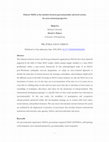
China Information, 2020
The relations between society and Non-governmental organizations (NGOs) have been relatively negl... more The relations between society and Non-governmental organizations (NGOs) have been relatively neglected in the field of China NGO studies, which remains largely wedded to a state-NGO problematic within a state-society framework. In this anthropological study of an NGO's post-Wenchuan earthquake recovery programme, we adopt an actor-oriented approach to identify the main lines of tension between the strategies, rationalities, and techniques deployed by the different actors in the field. Focusing on NGO-society relations, we take the NGO not as an incarnation of society visa -vis the state, nor as an incarnation of the state visa -vis society, but as a key link in a shifting chain of state and non-state actors that aim to introduce to local society an assemblage of techniques, discourses, and values for the promotion of self-government. This 'international development package' is a specific form of what social scientists have theorized as 'governmentality'. In this case study, the modalities of participation and cooperative self-government promoted within this development package are in tension with local values, social relations, and political structures. The case shows that dynamic tensions between the actors are mediated by the deployment of practices of governance that circulate between international institutions and networks, state agencies, NGOs, and local authorities and actors.
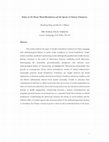
Current Anthropology, 2020
This article explores the angst of deeply committed volunteers in China, engaging with anthropolo... more This article explores the angst of deeply committed volunteers in China, engaging with anthropological debates on ethics under conditions of 'moral breakdown.' Under market socialism, sacrificial volunteering is both ideologically glorified and socially deviant, placing volunteers at the point of dissonance between conflicting moral discourses. Interrogating the monolithic governmentality perspective that informs most anthropological studies of volunteering, we highlight the 'fractured governmentality' that prevails in contemporary China, where contradictory modes of ethical subjectivation structurally generate moral breakdown. Volunteers are caught between the moral imperatives of altruistic sacrifice derived from China's socialist revolutionary tradition, and 'neo-liberal' utilitarianism derived from market rationality. Unable to articulate their commitment in reference to either moral code, they are at a loss of words, and produce an ethics of emotional authenticity that resists incorporation into any discursive ethical system. Instead of public engagement, volunteering becomes a private, misunderstood and unspoken personal choice, an emotional act or a concealed 'faith' that warrants no ethical justification. Undermining the dichotomy between the inertia of moral habitus and the reflexive ethics of creative agency that structures much of the anthropological theorization of moralities, the Chinese volunteers point to what we call an embodied ethics of the heart.
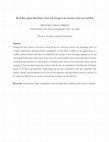
Hau: Journal of Ethnographic Theory, 2020
During the mass protest movement, Hong Kong has witnessed intense and disturbing levels of violen... more During the mass protest movement, Hong Kong has witnessed intense and disturbing levels of violence, intolerance, and anti-Chinese xenophobia. In this article, I reflect on the aggravation of a conflict system in which both sides are vitalized by the energies of fear and anger supplied by the real and imagined intrusions of the other. I trace the roots of this conflict system in the historical formation of Hong Kong's identity as a sacred space of freedom under threat from Communist China, and the merging of these localized structural tensions with the rise of a globalized existential fear of Chinese power in the West and elsewhere. Hong Kong has become a frontline in the new Cold War. The hatred, violence, and Sinophobia can be seen as the explosion, through human emotions and acts, of the sparks and flames at one of the hottest points of friction on the fault line.
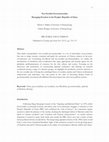
Economy and Society, 2019
This article conceptualizes 'neo-socialist governmentality' as a set of rationalities of governan... more This article conceptualizes 'neo-socialist governmentality' as a set of rationalities of governance that aim to shape, nurture, constrain and guide the autonomy of Chinese subjects in the post-revolutionary era. Contrasting neo-liberal and neo-socialist governmentalities, we outline the mechanisms of translation and coordination that open, appropriate and restrain spaces for the pluralistic problematization of concerns for the self, culture, and society. Focusing on the discourses and institutions of 'constructing spiritual civilization' and drawing on research conducted among a range of voluntary groups, we highlight the productive tensions inherent to the neo-socialist aim of fusing the centrifugal forces of socialist, market and Chinese civilizational subjectivities and authorities. Our case points to the value of theorizing distinct forms of governmentality associated with different historical trajectories and socio-political systems.
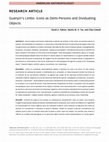
American Anthropologist, 2019
How do objects and humans relationally constitute one another? In this article, we examine statue... more How do objects and humans relationally constitute one another? In this article, we examine statues of Guanyin, the bodhisattva of compassion, in Hong Kong to illuminate the forms of personhood and agency that arise through human-icon relations in a modern metropolis. We follow the life course of Guanyin statues, investigating their production, circulation, animation, and disposal-teasing out worshippers' contradictory discourses on whether the deity is present in the statue or in the mind of the worshipper. These ethnographic observations lead us to consider how anthropological debates about the nature of cultural objects as representations or as agents parallel Guanyin practices and discourses in Hong Kong. We suggest how the ambivalent status of Guanyin statues is negotiated for practitioners as "demi-persons" and can be understood for anthropologists through the concept of the "dividuating object."
[material religion, animism, agency, personhood, icon, Hong Kong]
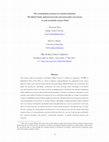
Modern Asian Studies, 2019
This article outlines the spread of the Bahá'í religion (known in Chinese as Datong jiao 大同教) in ... more This article outlines the spread of the Bahá'í religion (known in Chinese as Datong jiao 大同教) in Republican China (1912-1949), as a form of religious cosmopolitanism that originated in Iran, whose spread to China can be traced to links with the Ottoman Empire, British Palestine, the United States and Japan. By tracking the individuals, connections and events through which knowledge of the Bahá'í movement spread in China, our study reveals an overlapping nexus of networks that shared cosmopolitan ideals: intellectual reformers, liberal Christians, Esperantists, Confucian modernizers, redemptive society activists, and socialists. The Bahá'í connections serve as a thread that sheds light on a unique 'cosmopolitan moment' in Republican China, hitherto largely ignored in the scholarly literature on this period, which has focused primarily on the growth of modern Chinese nationalism. Leading nationalist figures endorsed these movements, showing that nationalism and cosmopolitanism were seen as expressions of the same ideal of world community, at a specific juncture of Asian colonial modernity. Through this case, we argue that the sociology of cosmopolitanism should attend to non-secular and non-state movements advocating utopian visions of cosmopolitanism, map the circulations that form a nexus of such groups, and identify the contextual dynamics that produce 'cosmopolitan moments' at specific historical junctures and locations.
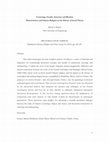
Review of Religion and Chinese Society, 2019
This article interrogates the near complete absence of China as a source of materials and inspira... more This article interrogates the near complete absence of China as a source of materials and inspiration for constructing theoretical concepts and models in mainstream sociology and anthropology. I outline the story of the largely forgotten mutual engagements, influences and missed connections between the work of the French Sociologist and Sinologist Marcel Granet (1884-1940), whose work revolved around Chinese religion, and key figures in the history of sociological and anthropological theory, exemplified by Durkheim, Mauss, and Levi-Strauss. My purpose is to restore Granet-and, through Granet, China-into the genealogy of classical anthropological and social theory. This involves showing how Granet's work was informed by the theoretical debates that animated his mentors and colleagues in the French sociological school, and how he, in turn, directly or indirectly influenced subsequent theoretical developments. It also involves raising questions about the implications of connections that were missed, or only briefly evoked, by theoreticians in subsequent generations. These questions open bridges for advancing a mutually productive dialogue between the study of Chinese cosmology, religion and society, and theoretical construction in sociology and anthropology.
Harvard Journal of Asiatic Studies, 2018
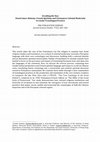
Journal of Asian Studies, 2018
This article takes the case of the Vietnamese Cao Dai religion to examine how Asian religious lea... more This article takes the case of the Vietnamese Cao Dai religion to examine how Asian religious leaders and translators, in a context of colonial modernity, invested a European language with their own cosmologies and discourses, building both a national identity and an alternative spiritual universalism. Studies of translation in colonial contexts have tended to focus on the processes and impact of translating European texts and ideas into the languages of the colonised. Here we discuss the inverse process, examining how Caodai textual production used French spiritist language and tropes to occult its Chinese roots, translating Daoist cosmology into a universalist anti-colonial spiritual discourse rooted in Vietnamese nationalism. We examine these shifts through a close examination of translingual practices in the production and translation of the core esoteric scripture of Caodaism, the Đại Thừa Chơn Giáo (大乘真教,"The True Teachings of the Great Vehicle"), rendered in its 1950 Vietnamese-French edition as "The Bible of the Great Cycle of Esotericism." Our study demonstrates how colonial religious institutions and networks of circulation in Asia stimulate the emergence of new movements and textual practices that mimic, invert, jumble and transcend the cosmologies of both the Chinese imperium and of the European colonial regime.
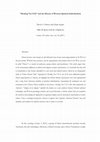
Cahiers d’Extrême-Asie, 2017
Daoist practices and concepts of self-cultivation have become increasingly popular in the West in... more Daoist practices and concepts of self-cultivation have become increasingly popular in the West in the past decades. Whether these practices, and the organizations that promote them in the West, can even be called "Daoist" is a matter of controversy among scholars and practitioners. This article argues that, in the transnational diffusion of cultural and religious concepts and practices, it is inevitable that they will be transformed as they become embedded in a new social and cultural context. Based on an ethnographic study of "China Dream Trips" organized by Healing Tao USA, one of the most influential popular Daoist organizations in America, we highlight how Daoist identity and practices have been appropriated into a long Euro-American tradition of spiritual individualism, transmuting the ontological core and orientation of the Chinese Daoist tradition in the process. Healing Tao USA, like other proponents of America's "religion of no religion," upholds the promise of a new synthesis between Oriental spiritual technologies and Western psychology, freedom and sexual liberation-a holistic culture that can transform the world by transcending the dogmatism of organized religion and the mechanistic materialism of secular culture. From a sociological perspective, however, it appears that "popular American Daoism" may well reproduce and reinforce the cultural structures that it claims to overcome.

Uploads
Books by David Alexander Palmer
In this absorbing and revealing book, David A. Palmer relies on a combination of historical, anthropological, and sociological perspectives to describe the spread of the qigong craze and its reflection of key trends that have shaped China since 1949, including the search for a national identity and an emphasis on the absolute authority of science. Qigong offered the promise of an all-powerful technology of the body rooted in the mysteries of Chinese culture. However, after 1995 the scientific underpinnings of qigong would come under attack, its leaders denounced as charlatans, and its networks of followers, notably Falungong, suppressed as “evil cults”.
According to Palmer, the success of the movement proves that a hugely important religious dimension not only survived under the CCP, but was actively fostered, if not created, by high-ranking party members. Tracing the complex relationships among the masters, officials, scientists, practitioners, and ideologues involved in qigong, Palmer opens a fascinating window on the transformation of Chinese tradition as it evolved along with the Chinese state. As he brilliantly demonstrates, the rise and collapse of the qigong movement is key to understanding the politics and culture of post-Mao society.
Journal articles by David Alexander Palmer
[material religion, animism, agency, personhood, icon, Hong Kong]
In this absorbing and revealing book, David A. Palmer relies on a combination of historical, anthropological, and sociological perspectives to describe the spread of the qigong craze and its reflection of key trends that have shaped China since 1949, including the search for a national identity and an emphasis on the absolute authority of science. Qigong offered the promise of an all-powerful technology of the body rooted in the mysteries of Chinese culture. However, after 1995 the scientific underpinnings of qigong would come under attack, its leaders denounced as charlatans, and its networks of followers, notably Falungong, suppressed as “evil cults”.
According to Palmer, the success of the movement proves that a hugely important religious dimension not only survived under the CCP, but was actively fostered, if not created, by high-ranking party members. Tracing the complex relationships among the masters, officials, scientists, practitioners, and ideologues involved in qigong, Palmer opens a fascinating window on the transformation of Chinese tradition as it evolved along with the Chinese state. As he brilliantly demonstrates, the rise and collapse of the qigong movement is key to understanding the politics and culture of post-Mao society.
[material religion, animism, agency, personhood, icon, Hong Kong]
Guanyin means “perceiver of sounds” and refers to the deity’s ability to hear the cries of the suffering beings in this world. Guanyin is the Chinese name for Avalokitesvara, who has been worshipped throughout the Buddhist world and has even been described as “the cult of half of Asia.” However, Avalokitesvara has never been worshipped as a goddess in India, Sri Lanka, or Southeast Asia. In Tibet, the Dalai Lama (always a man) is considered to be the reincarnation of Avalokitesvara. Many tenth-century paintings from Dunhuang, on the Silk Road in west China, show him with a moustache. The sexual transformation from a masculine figure to a goddess seems to be a Chinese phenomenon, and has to do with the story of Princess Miaoshan (Wonderful Goodness).
本文的研究對象是廣東省英德市黃花鎮溪村的醮儀,它於2007年2月被英德市人民政府列入英德市「非物質文化遺產」名錄。
Prior to 1949, body cultivation techniques were widely practiced in monastic, medical, literati and sectarian circles, but there existed no self-conscious movement aiming to unite all practitioners. Although the term Qigong had appeared in a handful of books in the first half of the 20th century and earlier, the term was seldom used and it had not acquired its modern meaning. It was only after 1949 that Qigong became a generally used term, including in a single category all Chinese gymnastic, meditation, visualisation and breathing techniques, to which, over the years, were added martial, performance, trance, divination, charismatic healing, and talismanic techniques, as well as the study of paranormal phenomena, UFOs, the Book of Changes, etc.